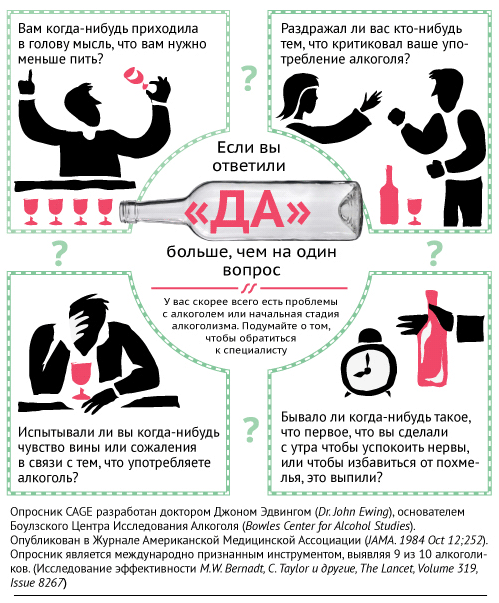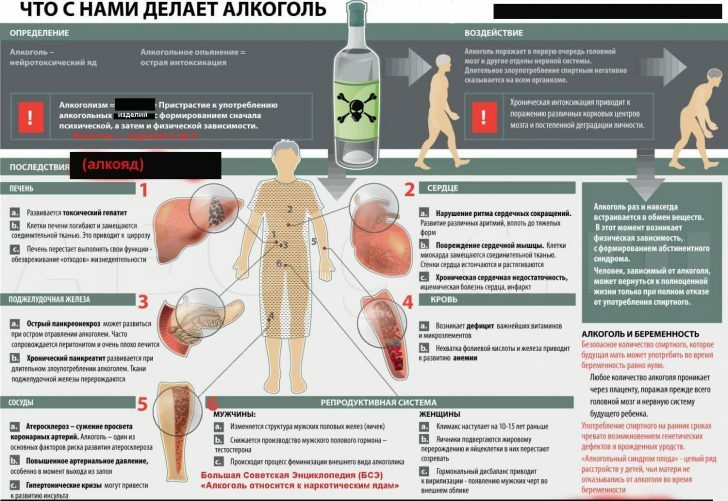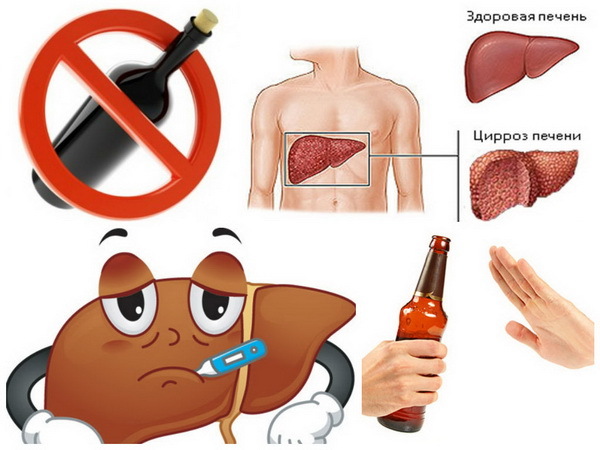Symptoms and consequences of alcoholism

In the previous article, we discussed in detail the causes and classification of such conditions as alcoholism and alcoholism.As you have already noticed, the abuse of alcoholic beverages is unattractive and carries not only addiction, but also the destruction of personality.A pleasant feeling of euphoria is replaced by painful phenomena, and sometimes - by terrible complications, endangering the very life of a person.What are the symptoms unconditionally testify not only to drunkenness, but about alcoholism?Let's talk about everything in order.
Table of contents: Symptoms of I( initial) stage of alcoholism Symptoms of stage II( stage) of alcoholism Signs of stage III of alcoholism Consequences of alcoholismSymptoms of I( initial) stage of alcoholism
Recommended:Alcohol cravingUsually justified by stresses, dislocations at work, domestic problems, confusion in the family, etc.But all this is nothing more than "excuses."
Note: attraction arises against the background of changes that occurred in the brain.In the cerebral cortex, a "center" of attraction is formed, which subordinates the entire emotional-volitional sphere of a person, dulls all logical connections, flatten thinking.
Gradually, alcoholic degradation of personality begins to develop.People notice changes in the appearance and behavior of the drinker.More and more often, remarks and reproaches sound in his address.Excuses are diverse: "What do you want from me, I'm an alcoholic, I'm lying under the fence," "do not carry me, they are to blame."
Here it is in full measure and reveals the difference between just a drunkard and an alcoholic.

Note: the drunkard can independently resist the desire to drink.Settling, set a task - "no more drinking."And most importantly, bring it to the end.But the alcoholic in the vast majority of cases - no.
Periodically( or constantly) the resulting craving for the first stage of alcoholism dominates all sensible ideas and promises.The psychic of the drinker begins to break down.The patient ceases to believe in himself.In his words more and more often lies a lie, the purpose of which is self-justification and justification in the eyes of others of the fact that he drinks.
Guilty, he does not consider himself to be guilty.Here, in his understanding of the reasons and "bad wife", and "stressful work", and "bad surrounding."Over time, there are more and more "drunk" days, fewer sober.
Note: very important features of I stage of alcoholism - increased resistance to doses of alcohol and loss of emetic reflex.
In terms of vodka, the patient drinks 0.5-0.75 liters per day.Increasing stability is due to biochemical protective reactions of the body to chronic alcohol poisoning.
Addictive is a kind of adaptation.In the people, this "phenomenon" is considered a sign of health."He can drink a lot, and sober, like a glass."The absence of vomiting in the morning is also considered a sign of "strength."In fact, these are very sad signs of alcoholism.Vomiting can occur again, if incidentally, the disease of the gastrointestinal tract or liver.
The patient at the first stage with intoxication increasingly appears "memory failure", there are symptoms of mental disorders - attacks of aggression, a propensity for suicide.Euphoria is prolonged up to 8 hours.Sobering up is accompanied by depression and a desire to drink more.Periodically the patient drinks to a level of severe intoxication.
At the first stage of alcoholism patients rarely lose quantitative control of over the drunk.Also, the situational control of the is saved, that is, the alcoholic does not get drunk in places where he will be noticed - at work, at a party, etc.But in his "own" circle or at home, he already drinks the way his wishes dictate to him.
Over time, the personality undergoes profound changes.The circle of interests is narrowing, there is a reassessment of their capabilities, accompanied by bragging.Increases indifference to relatives and others.Behavior is dominated by rudeness and impudence, shamelessness.These symptoms are commonly called alcoholic personality degradation.
Important: forms the mental dependence on the 1st stage of alcoholism, which is manifested by the growing motivation of alcoholization, which supersedes all other thoughts and desires.In this version, alcoholism smoothly flows into the next stage.What happens next?
Symptoms of the( extended) stage of alcoholism
The main symptom of the second stage of alcoholism is withdrawal symptoms( hangover). Everyone knows the word.But let's understand its meaning scrupulously, because there is a significant difference between what is usually meant in everyday life under the word "hangover".
We recommend reading:  For drinkers without dependence - this condition occurs as a response to alcohol poisoning.It arises after a massive alcoholization and manifests itself, as a rule, in the morning with a headache, nausea, vomiting, full intolerance to alcohol.If such a person pour alcohol, then he will develop vomiting.To alleviate these unpleasant symptoms can simply intake of liquid, especially brine, kvass, beverages that reduce the malfunction of acid-base balance.
For drinkers without dependence - this condition occurs as a response to alcohol poisoning.It arises after a massive alcoholization and manifests itself, as a rule, in the morning with a headache, nausea, vomiting, full intolerance to alcohol.If such a person pour alcohol, then he will develop vomiting.To alleviate these unpleasant symptoms can simply intake of liquid, especially brine, kvass, beverages that reduce the malfunction of acid-base balance.
In patients with stage 2 alcoholism , the true hangover ( withdrawal syndrome) is manifested by severe symptoms of physical ailment and mental changes.This condition is removed only by taking a small amount of alcohol.
It is important not to confuse people's understanding of "drunk" , in which people who do not suffer from alcoholism after an event associated with drinking in the morning take a small amount of alcohol.It's just a new intoxication, not associated with true abstinence.
With hangover syndrome of the 2 stages of alcoholism, patients have marked sweating, trembling( tremor) of the fingers, hands, and bodies.Arterial blood pressure is sharply increased, arrhythmia arises( rapid heartbeat with interruptions).Breathing frequent, uneven.The general condition is irritated, the patients experience fears, fears, coordination is severely disrupted.All these symptoms are quickly removed by a small amount of alcohol.
Note: in alcoholics of the 2nd stage is formed physical dependence. It's not just that you want to drink, but you have to drink, because without alcohol, the psyche and the body as a whole experience pain and discomfort.
It is not for nothing that withdrawal syndrome in alcoholism is also called withdrawal syndrome - its symptoms are stopped by taking a new dose of alcohol.And the condition itself is caused by a disturbance in the metabolism caused by alcoholism.
Attraction to alcoholic beverages at the II stage in patients is so strong that it eclipses all other desires and vital incentives.Attraction leads to the fact that the patient is ready to go for anything, for the sake of receiving his usual dose.The people around are already beginning to understand that the drinker is sick, and it will be impossible to do without outside help.
Persuasion, threats, explanations are not perceived by an alcoholic, even in a sober state.The majority of patients in stage II of alcoholism have no criticism of their condition.Even realizing the perniciousness of what is happening, the drinker does not want to admit that he is ill, shows dodginess and hostility when trying to help him.
Forced refusal of alcohol leads to a state of dissatisfaction, mood swings, depression, physical weakness, sleep disorders, apathy.To the surrounding patient becomes picky and spiteful.Inside, there is a constant attraction to alcohol, which sooner or later becomes uncontrollable.
Drinking alcohol gives him a sense of mental and physical comfort.Doses of alcohol consumed grow to 1-2 liters per day.The cases of taking 5-6 liters of vodka per day are described.
There are different forms of alcoholization ( constant, drunken, pseudo-populous, intermittent) .On these variants of abuse we will stop below.
"Typical" day of the patient II stage of alcoholism looks like this: in the morning the alcoholic gets hung up with a small dose of alcohol, comes back to normal, the phenomena of withdrawal disappear.In the afternoon, traction appears, which is compensated by a second dose that is already more significant than the morning dose.By the evening the alcoholic takes the basic, massive "portion", reaching a heavy degree of intoxication.Usually, patients of this stage drink mostly strong alcoholic beverages, surrogates of alcohol.
After deep degrees of intoxication in the II stage of alcoholism, patients lose the fixation of events, they have memory dips.Control over the drunk is lost.They drink such people everywhere.
Externally, alcoholics look sloppy, they have "chanted speech"( plaiting language with problems of pronunciation of sounds, letters and phrases).Hysterical traits predominate in behavior, they are prone to sociopathic actions.Measure and responsibility are completely absent.
Note: in the treatment of alcoholism, stage 2 can drag on for decades.Without treatment, most patients die from all sorts of complications, alcohol poisoning, psychosis.
Symptoms III( final, encephalopathic) stage of alcoholism
 Drinking at the III stage of alcoholism become completely desocialized.They have no housing, family, work, there is a pronounced degradation of the individual.
Drinking at the III stage of alcoholism become completely desocialized.They have no housing, family, work, there is a pronounced degradation of the individual.
Alcoholics get drunk from small doses.Euphoria is short, after it comes a short sleep and then another dose is required.The amount of alcohol consumed per day is significantly lower than at stage 2.When you try to drink more, another vomiting reflex arises, which causes the patients to drink in small doses.Aggressiveness, characteristic for stages 1 and 2, is absent, the patient has a completely desocialized appearance, the behavior is quiet.He is dressed in a dirty, unwashed, hungry, exhausted, usually "beggar," who is ready for anything to get money for drinking.
Consequences of alcoholism
The most dangerous and common problems with alcoholism are alcoholic psychoses. Among them are acute and chronic.The most famous acute psychosis is "white fever" ( alcoholic delirium), which occurs in 75% of complications.More often they suffer patients in the started 2 stages of alcoholism.

Clinical manifestations of this pathology occur after 2-3 days of complete abstinence, a sharp break after a prolonged intake of alcohol.Patients become restless, they have fear, illusions and hallucinations.Outwardly - a strong tremor in the body, a marked palpitation, sweating.Symptoms are increasing.Patients can scream, hide, talk with invisible enemies, fantastic creatures, flee from them.The acute period lasts for several days.In severe cases and without treatment, death occurs.The reason for this complication of alcoholism is cerebral edema.
Note: is an interesting fact - the patients after the release of the white fever clearly remember their hallucinatory experiences and can describe in detail all their visions and sensations.
Alcoholic delirium can be repeated.
This complication of alcoholism, such as , is an alcoholic hallucinosis. With this kind of psychosis in the patient against the background of emerging visions and hallucinations, a more or less critical attitude towards them persists.
Chronic alcoholic psychoses take months.Characterized by milder hallucinatory experiences and often with a delirium of jealousy.
Complications of alcoholism from internal organs
 The incidence of internal diseases in individuals with attachment to drinking has been increased almost 2-fold.These data were established in the study of workers in Moscow in 1975 N.Ya.Hoof.But there are specific lesions, both internal organs and the nervous system, characteristic of the long-term toxic effects of alcohol.The toxic effect of alcohol has a destructive effect on all organs and systems, but basically it is attacked by the "weak link", that is, already existing pathology or predisposition to it.
The incidence of internal diseases in individuals with attachment to drinking has been increased almost 2-fold.These data were established in the study of workers in Moscow in 1975 N.Ya.Hoof.But there are specific lesions, both internal organs and the nervous system, characteristic of the long-term toxic effects of alcohol.The toxic effect of alcohol has a destructive effect on all organs and systems, but basically it is attacked by the "weak link", that is, already existing pathology or predisposition to it.
The most commonly affected:
- nervous system( brain and peripheral departments);
- cardiovascular system;
- digestive.
Complications that alcohol gives to the brain and psyche for alcoholism are described above.In addition to degradation, alcoholics develop alcoholic polyneuropathy. The manifestation of this complication is expressed by complaints about sensations of numbness, "running of the goose bumps", pulling pains in the limbs, muscle weakness, cramps, trembling in the hands.
The next target is the heart and blood vessels.The patients develop alcoholic cardiopathy - heart muscle damage, caused by the influence of alcohol on the cardiac cells.As a result of this exposure, a number of metabolic problems arise in the tissues of the heart, which lead to a disruption in muscle nutrition.Gradually formed heart failure, exacerbated by the negative effect of nicotine, as most patients smoke.Affects the lack of thiamine, which is destroyed by alcohol, as well as metabolic disorders.
Cardiopathy with alcoholism manifested by shortness of breath, palpitations, irregularities, swelling.With the abstinence of the patient from alcohol and treatment, heart symptoms gradually go away.
Problems with the liver are also a very characteristic complication of alcoholism.Alcohol has a direct damaging effect on the hepatic cells - hepatocytes.There is a violation of all types of exchange.

The easiest degree of liver damage - alcoholic fatty degeneration is rare.It is accidental when examining the patient and is characterized by an increase in the liver, its increased density.With a sober way of life, pathology undergoes reverse development.
More serious is the alcoholic hepatitis. Is manifested by complaints of eructation, dull pain in the right hypochondrium, bloating, nausea.The liver is denser and enlarged than in dystrophy, painful.In the analyzes, alkaline phosphatase activity is noticeable.Appearance of the patient - exhausted, vomiting, temperature, diarrhea, jaundice.In the case of refusal from alcohol, the illness is partially gone, but there are still consequences.
The most dangerous complication is alcoholic cirrhosis of the liver. Patients with:
- lack of appetite,
- severe emaciation,
- depression of mood,
- enlarged spleen.
In more severe cases, fluid accumulates in the abdominal cavity( ascites), jaundice, bleeding, hepatic insufficiency develops.The outlook is unfavorable.
The toxic effect of alcohol on the pancreas leads to the development of a formidable complication of alcoholism - pancreatitis( inflammation of the pancreas). The disease is often combined with liver problems and gives a complex picture of complaints and clinical manifestations.Strong shivering pains in the abdomen, giving in the back are especially characteristic.
The stomach and intestines suffer from alcoholism.Gastritis, enteritis, enterocolitis - frequent companions of the disease.
These are the sad consequences can give a pernicious passion for drinking.
More detailed information on the formation of dependence on alcohol, the effect of ethanol on the body and the consequences of alcoholism you will get by viewing the video review:
Alexander Lotin, narcologist



